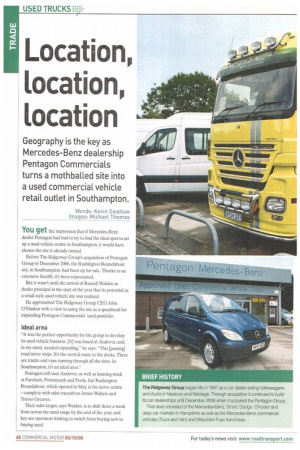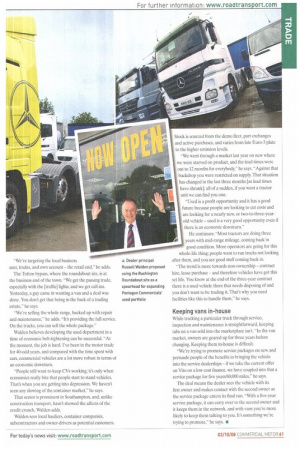Location, Location, Location
Page 60

Page 61

If you've noticed an error in this article please click here to report it so we can fix it.
Geography is the key as Mercedes-Benz dealership Pentagon Commercials turns a mothballed site into a used commercial vehicle retail outlet in Southampton.
Words: Kevin Swallow Images: Michael Thomas
You get the impression that if Mercedes-Benz dealer Pentagon had had to try to find the ideal spot to set up a used vehicle centre in Southampton, it would have chosen the site it already owned.
Before The Ridgeway Group's acquisition of Pentagon Group in December 2006, the Rushington Roundabout site, in Southampton, had been up for sale. Thanks to an extensive facelift, it's been rejuvenated.
But it wasn't until the arrival of Russell Walden as dealer principal at the start of the year that its potential as a retail-style used vehicle site was realised.
He approached The Ridgeway Group CEO John O'Hanlon with a view to using the site as a spearhead for expanding Pentagon Commercials' used portfolio.
Ideal area
"It was the perfect opportunity for the group to develop its used vehicle business. [It] was based at Andover, and, in my mind, needed expanding," he says. "This [passing] road never stops. It's the central route to the docks. There are trucks and vans running through all the time. In Southampton, it's an ideal area."
Pentagon still uses Andover, as well as housing stock at Fareham, Portsmouth and Poole, but Rushington Roundabout, which opened in May, is the nerve centre — complete with sales executives James Walters and Trevor Greaves.
Their sales target, says Walden, is to shift three a week from across the used range by the end of the year, and key are operators looking to switch from buying new to buying used. -We're targeting the local business user, trades, and own account — the retail end," he adds.
The 'Cotton bypass, where the roundabout sits, is at the business end of the town. "We get the passing trade, especially with the [traffic] lights, and we get call-ins. Yesterday, a guy came in wanting a van and a deal was done. You don't get that being in the back of a trading estate," he says.
"We're selling the whole range, backed up with repair and maintenance," he adds. "It's providing the full service. On the trucks, you can sell the whole package."
Walden believes developing the used department in a time of economic belt-tightening can be successful. "At the moment, the job is hard. I've been in the motor trade for 40-odd years, and compared with the time spent with cars, commercial vehicles are a lot more robust in terms of an economic downturn.
"People still want to keep CVs working; it's only when economics really bite that people start to stand vehicles. That's when you are getting into depression. We haven't seen any slowing of the container market," he says.
That sector is prominent in Southampton, and, unlike construction transport, hasn't showed the affects of the credit crunch, Walden adds.
Walden sees local hauliers, container companies, subcontractors and owner-drivers as potential customers. Stock is sourced from the demo fleet. part exchanges and active purchases, and varies from late Euro-3 plate to the higher emission levels.
"We went through a market last year on new where we were starved on product, and the lead times were out to 12 months for everybody," he says. "Against that backdrop you were restricted on supply. That situation has changed in the last three months [as lead times have shrunk]; all of a sudden, if you want a tractor unit we can find you one.
"Used is a profit opportunity and it has a good future because people are looking to cut costs and are looking for a nearly new, or two-to-three-yearold vehicle — used is a very good opportunity even if there is an economic downturn."
He continues: "Most tractors are doing three years with mid-range mileage, coming back in good condition. More operators are going for this whole-life thing; people want to run trucks not looking after them, and you see good stuff coming back in.
"The trend is more towards non-ownership — contract hire, lease purchase — and therefore vehicles have got this set life. You know at the end of the three-year contract there is a used vehicle there that needs disposing of and you don't want to be trading it. That's why you need facilities like this to handle them," he says.
Keeping vans in-house
While tracking a particular truck through service, inspection and maintenance is straightforward, keeping tabs on a van sold into the marketplace isn't. "In the van market, owners are geared up for three years before changing. Keeping them in-house is difficult.
"We're trying to promote service packages on new and persuade people of the benefits in bringing the vehicle into the service dealerships — if we take the current offer on Vito on a low-cost finance, we have coupled into that a service package for five years/60,000 miles," he says.
The deal means the dealer sees the vehicle with its first owner and makes contact with the second owner as the service package enters its final run. "With a five-year service package, it can carry over to the second owner and it keeps them in the network, and with vans you're more likely to keep them talking to you. It's something we're trying to promote," he says. •




































































































































































